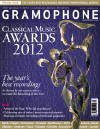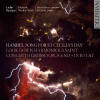Texte paru dans: / Appeared in:
*

GRAMOPHONE (Awards Issue 2012)
Pour s'abonner /
Subscription information
Delphian
DCD34110

Reviewer: David Vickers
More Handel from Ludus Baroque in
Edinburgh
Handel set Dryden’s sophisticated St Cecilia ode Alexander’s Feast in
1736 and three years later he turned his attention to Dryden’s earlier,
shorter and more literal A Song for St Cecilia’s Day. The reason for
the composition was typically practical: he needed something to form a
makeshift third part for his 1739 revival of Alexander’s Feast, which
was too short to fill an entire evening at the theatre (this is not
explained in David Kimbell’s otherwise illuminating booklet essay). On this
occasion Handel’s Dryden settings were performed alongside an unidentified
concerto from his newly composed Op 6 collection; in this spirit, Ludus
Baroque follow the shorter ode with a neatly attractive performance of Op 6
No 7. As a bonus, Ed Lyon fervently sings the short St Cecilia cantata
Look down, harmonious saint (composed in 1736 but never used). The ode
receives an orderly performance. I wish there were double the number of
string-players: the sonority of only six violins is insufficiently grand for
the overture’s opening. Lyon does not achieve the ideally awestruck sense of
timeless mystery and dramatic rhetoric in ‘From harmony, heav’nly harmony
this universal frame began’, although I liked the relaxed shapeliness of the
ensuing chorus. The cello obbligato in ‘What passion cannot music raise and
quell’ is played poignantly by Chris Suckling (the interjecting violins and
oboes seem ploddy); Mary Bevan gorgeously conveys the pious poetry of ‘But
oh! what art can teach’ ( organist Jan Waterfield’s contributions contain a
few surprising embellishments). The unaffected 19-strong choir outweighs the
slimline orchestra at times. Trevor Pinnock and Robert King have more to say
in illustration of Dryden’s words and Handel’s musical details but kudos to
Delphian for the intelligent choice of cover art, reflecting Dryden’s first
stanza discussing the creation of the universe.
Cliquez l'un ou l'autre
bouton pour découvrir bien d'autres critiques de CD
Click either button for many other reviews


